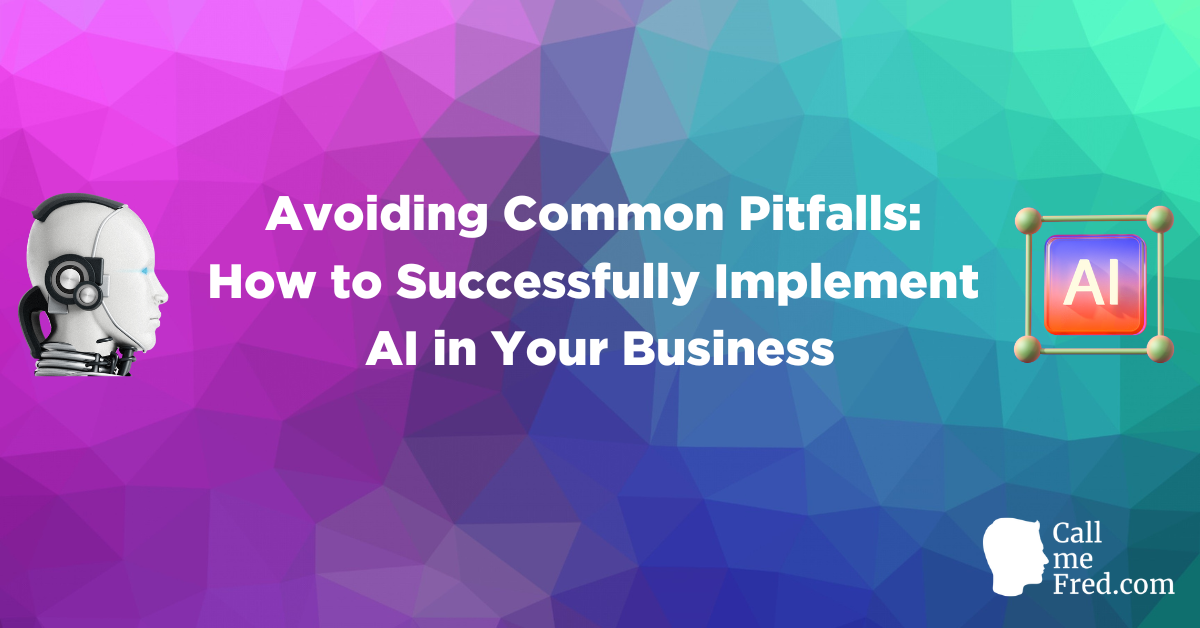Artificial intelligence (AI) has revolutionized the way in which businesses operate, but it’s easy to make mistakes when implementing such tools. From adopting too many AI resources at once to ignoring the need for a single source of truth for your data, these mistakes can cause inconsistencies and weaken the effectiveness of AI.
Failing to analyse enough data
One common mistake is failing to analyze enough data. Without enough data, AI won’t be effective, and it can be challenging to take full advantage of its capabilities. Businesses must ensure that their data is clean and structured to extract maximum benefits from AI. They must also avoid assuming that AI is a catch-all solution and misidentifying the problem and solution.
Implementing technology for its own sake
Another common error is implementing technology merely for its own sake without sufficient data. Some people wrongly assume that AI tools are a one-size-fits-all solution, leading to incorrect structuring of data sets and implementing siloed solutions without a broader strategy. They must also ensure that they have the right team in place to manage AI initiatives.
Lack of staff training & lack of documentation
Companies need to balance human and automated interactions, to measure AI’s impact carefully, and to train employees properly when introducing AI systems. Neglecting monitoring and maintenance of AI projects, inadequate planning, and visualization of chatbot implementation, and failing to leverage data to improve chatbot interactions are other mistakes to avoid.
Lack of data care & maintenance
To successfully implement AI, companies must avoid common pitfalls such as misidentifying the use case, hiring the wrong talent, neglecting proper data care and maintenance, failing to maintain accuracy and effectiveness, and overlooking potential biases in available data. Companies need to approach AI implementation with a strategic plan and prioritize considerations such as data privacy, ethics, and transparency. These factors can affect the success of AI initiatives.
Over-inflated expectations
Users should also be cautious not to begin directly with deep learning, which requires a lot of computing power and can struggle with smaller data sets. Influenced AI models can also bias analysis and decision-making. Each business domain should not expect accuracy with all AI processes; interpretability is also essential. However, rushing to learn every AI concept practically can lead to non-accurate results. Therefore, users should take their time to validate and create reliable AI models.
Lack of personal human touch
When it comes to AI and ML in customer service, companies must be careful not to make common mistakes that can detract from the customer experience. These mistakes include relying too heavily on automation and ignoring the importance of personal touch. Instead, training staff to work alongside AI and monitor its performance is essential for success. Automating social interactions without careful planning can also result in a significant reputational risk.
It’s still a very delicate process
Developing AI and ML initiatives can be challenging for companies, and they must avoid common mistakes, such as not comprehending the resources required to train them. Relying on data brokers for unsuitable one-size-fits-all training data and misunderstanding the complicated path of AI development can lead to integration issues. Overlooking quality assurance testing and failing to hold regular reviews are other common mistakes.
A robust programmatic approach to AI development is necessary for companies to achieve long-term success. Businesses should choose a partner experienced in starting, testing, and deploying AI-based solutions. Ultimately, it’s essential to avoid those mistakes when it comes to AI and to approach its implementation with a comprehensive and holistic approach, prioritizing clean and structured data, a strategic plan, and an understanding of its limitations. By avoiding common pitfalls, companies can leverage the power of AI to offer efficient and effective customer service that strengthens brand loyalty.


 Subscribe to my weekly newsletter packed with tips & tricks around AI, SEO, coding and smart automations
Subscribe to my weekly newsletter packed with tips & tricks around AI, SEO, coding and smart automations







